
2007 was a year of trends aplenty, both overwrought and unspoken. Amidst the landfall of gargantuan threequels (of which few were worth their weight in box office figures) were a plethora of savory revisionist westerns (
The Assassination of Jesse James by the Coward Robert Ford,
There Will Be Blood,
No Country For Old Men), documentaries about topics both great (
Operation Homecoming,
Into Great Silence) and small (
Helvetica,
Rolling Like a Stone,
The King of Kong: A Fistful of Quarters,
The Cats of Mirikatani), and an unofficial trilogy of mind-blowing action films (
Exiled,
War,
Shoot ‘Em Up) that, through their own particular stylistic indulgences, looked at masculine codes of honor in ways both thrilling and humorous. Iraq dominated the multiplex in theory only, with the limp diatribes of
In the Valley of Elah and
Rendition disappearing almost without a trace, while two of the year’s finest releases were actually revamped staples from cinema past: Charles Burnett’s 1977 masterpiece
Killer of Sheep, and the latest (final?) version of Ridley Scott’s almost-as-great
Blade Runner. It was a prolific year for animation, from the no-holds-barred surrealist firebomb that was
Aqua Teen Hunger Force Colon Movie Film For Theaters to the timeless American familial values of
The Simpsons Movie to the dreamy landscapes of
Paprika to
Ratatouille’s effortless splendor to the political upheaval of
Persepolis. McLovin’ and Spider-Pig rightfully seized the box office, while it was the year’s onslaught of gritty, no-frills genre pictures (
Eastern Promises,
We Own the Night,
Black Snake Moan) that proved the necessary antidote to the rancid Zack Snyder/Frank Miller collaboration
300. A pair of nifty Stephen King adaptations (
1408,
The Mist) and two of the greatest zombie-ish films ever made (
28 Weeks Later,
Planet Terror) assured us that horror isn't dead, despite the hollow flogging emphasized by so many of the genre. The year’s worst films shared amongst them a single defining trait: more so than technical or artistic failings, they were one and all exercises in turgid and unjustified nihilism, marketing misanthropy as the new cool whilst further desensitizing their audiences to the far-reaching pains of the world.
French fries. A milkshake. A meatball. Masterpieces come in all shapes and sizes, and the feature-length adaptation of Cartoon Network's ultra-surrealist
Aqua Teen Hunger Force is an act of cinematic anarchy for the ages, dispensing of audience pretensions in a matter of moments before free-falling into a flabbergasting anti-narrative that exists somewhere between dadaist upheaval and Warholian self-examination.
The Simpsons has always been more loving and
South Park more scathing in their respective satires, but none is so subversively and forcefully deconstructive as this insane pop culture jambalaya.
The title of Paul Thomas Anderson's fifth feature is a promise to be fulfilled, for sure, but most intense about this epic adaptation of Upton Sinclair's
Oil! is his utter refusal to sympathize with Daniel Day-Lewis' brutal Daniel Plainview. Alternately (sometimes simultaneously) horrifying and bemusing,
There Will Be Blood rumbles like a turgid well before its histrionic breaking point, a regressive exclamation point that calls to attention our own self-destructive obsessions with money and faith.
A sermon-like immersion on an unprecedented scale,
Into Great Silence is the
2001: A Space Odyssey of documentaries, touching the infinite in its somber, restrained examination of religious life. Patience and meditation give way to enlightenment and transcendence, and so too does Philip Gröning's film reward our inquisition with invaluable wisdom on how best to live our lives.
Death is coming for us all, and all we can hope to do is to live with love and virtue before he comes knocking on our door. The Coens' meditation on fate and chance strikes chords at once universal and specific to our own time, while their cagey aesthetics - like Chigurh's restrained menace - continuously suggest a beast about to break free from its cage. Our suspense is baited not just for the lives of the characters on screen, but our own.
Zodiac is so blatantly anti-film in its construction that it could have been a documentary. David Fincher opts for the subtle underpass to his trademark stylistic flourishes and the result may be his best film to date, an absorbing look into the nature of obsession: for life, for power, for meaning, for truth. The intangible nature of each represents
Zodiac's devastating "based on a true story" relevance.
Following
Spider and
A History of Violence,
Eastern Promises continues David Cronenberg's shift from physical explorations to those more intangible. A mother without her daughter and a daughter without her mother represent the film's unspoken moral axis, while it is Cronenberg's delineating camera that most effectively gets to the bottom of his character's dichotomous identities.
Anderson will always be trounced upon by those who mindlessly equate quirk with superficiality, lest they actually deal with things on a case by case basis. Unlike the cute but simplistic
Juno, Anderson uses his touches not as substance but as flourishes, moments and memories infused into compact packages that speak for more than the sum of their parts.
Hotel Chevalier may be his finest hour yet, squeezing enough pain and longing into less than a quarter of an hour so as to rival his own feature-length masterpieces.
Films are our dreams and wishes, and
Paprika's self-devouring chaos proves an inescapable journey down the rabbit hole of our collective yearning for meaning and truth. Satoshi Kon's latest animated masterwork escapes contrivance by allowing its characters to stand defined through their actions, explaining its heady sci-fi narrative only just enough to send us on our own way into the abyss.
No unnecessary sequel of the past ten years has been as profoundly realized as Juan Carlos Fresnadillo's survival extravaganza, exploding out of an otherworldly ether as it propels the general storyline of Danny Boyle's original film into areas more fable-esque than straight horror. The ties of blood are strongly felt as the sins of our fathers return to haunt us - often in ways unseen, but here as violent and bloody as ever.
Herzog's films have never existed in a context larger than that which they fashion for themselves, and it is in this way that
Rescue Dawn's Dieter Dengler ascends to the same heights of primordial experience as Aguirre or Fitzcarraldo. At war with both man and nature, his transformation reflects not only the duties and necessities of the soldier in combat, but the malleability and endurance of the human spirit.
12:08 East of Bucharest,
Ratatouille,
Death Proof,
Rolling Like a Stone,
Exiled,
Broken English,
Superbad,
Black Snake Moan,
The Taste of Tea,
Helvetica
Hostel: Part II,
I Know Who Killed Me,
Zzyzx,
Bratz,
Park,
Captivity,
Smokin' Aces,
300,
Behind the Mask: The Rise of Leslie Vernon,
Shrek the Third

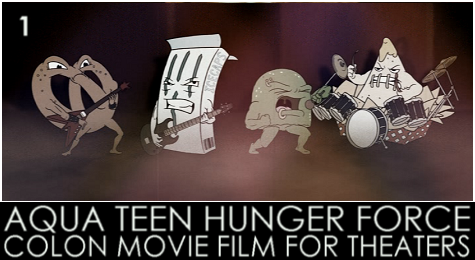
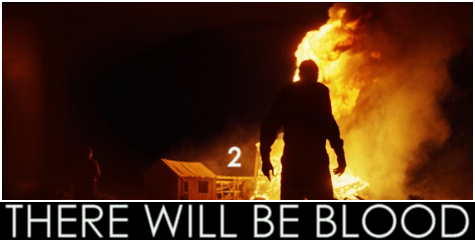
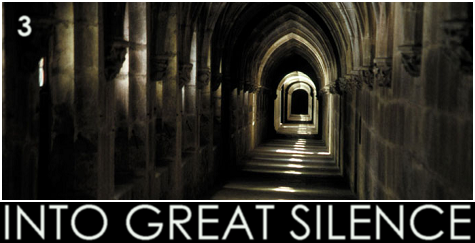
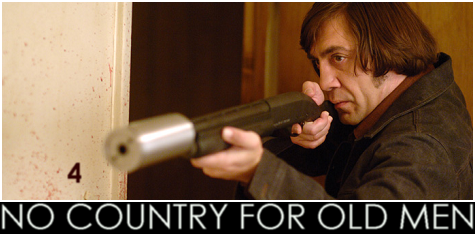
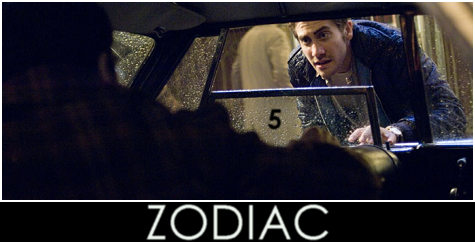
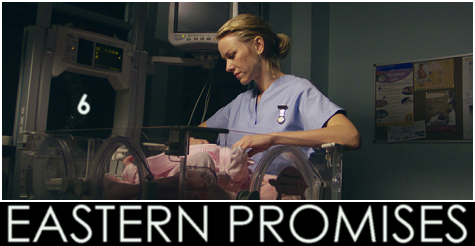
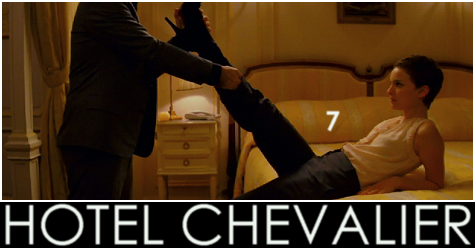
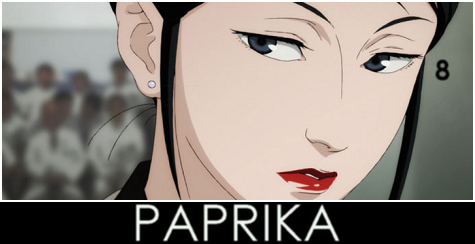
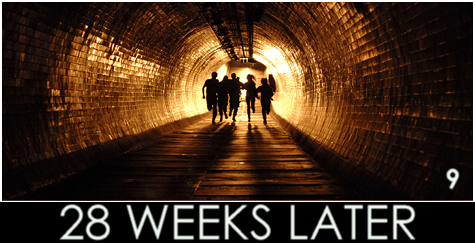
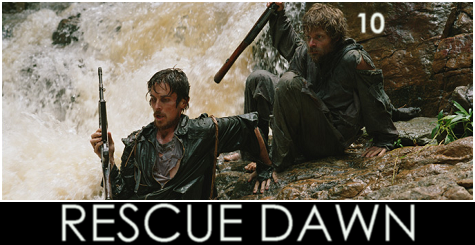

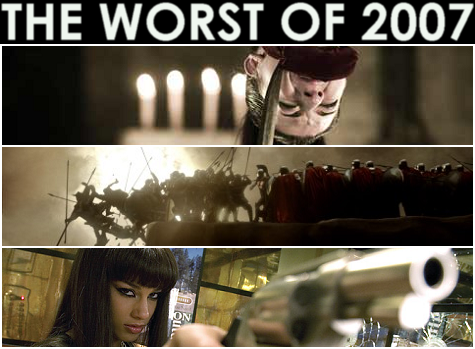

Wait a sec'... so War is actually good? You didn't write a review for that one, did you?
ReplyDeleteKudos for recognizing The Taste of Tea in your honorable mentions. It's a shame that so few critics have seen it, or I'm sure it would have been recognized by more top ten lists.
dennis r: Yeah, I kinda loved War, it being one of the few/only sleazy populist action movies of late to get at some genuine character/identity issues. It shares some common threads with Eastern Promises, although their styles are completely different. I didn't have time to review it, but it was one of the films that just missed the honorable mentions cut.
ReplyDeleteI'm suprised how many people didn't like Rescue Dawn. I loved it for simply bringing something new to a kind of story that's been told dozens of times before.
ReplyDeleteAnd here I was hoping Wes Anderson would not make your Top 10, but here he is. Hotel Chevalier was an ok experiment that does much less than you claim. But your list is great and looks great. I might have to watch Aqua Teen again, just to make sure my two and a half star rating was being too tough on it.
ReplyDeleteWell certainly, how much a film "does" can be approached objectively, but in the end we're all at least partially victim to our gut instincts. A lot of people probably agree with me on exactly what Aqua Teen does, but I can hardly fault them for not seeing it as profound a thing as I do. As far as Anderson goes, though, my fear (as far as list perfectionism goes) is that I'll end up liking/loving Darjeeling Limited far more on second viewing than I do now. His films tend to grow on me in retrospect. In terms of expounding on a particular romantic epoch, though, I thought Hotel Chevalier was something of a masterpiece.
ReplyDeleteI think there's an argument for _Darjeeling_ as his best film yet. But I'm terribly biased in favor of, and emotionally attached to, _Rushmore_. Still, I never realized how attached I was to his work until this year. But more on that tomorrow at THND.
ReplyDeleteFor now, for here: lookin good, dude.